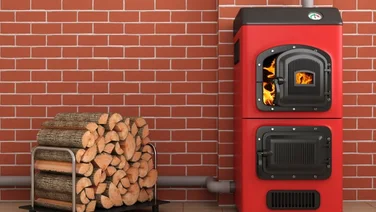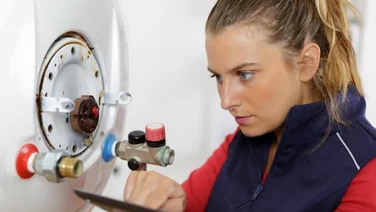We receive a small fee from trusted installers when you request a quote through our site. This helps us keep our content independent, well-researched and up to date – Learn more
✔ You can fix your boiler pressure in just a few simple steps
✔ Boiler cover might save you having to fork out hundreds to fix your boiler
✔ To get a bespoke quote for an efficient boiler, fill in the form above
Finding yourself having to fork out for a new boiler earlier than expected? It’s an unfortunate situation to find yourself in, but an inevitable consequence of neglecting your boiler (check out the cost of a new boiler).
If your boiler starts to play up, your first port of call should be to check the boiler pressure. Simply adding or reducing pressure to your central heating system can often save you from an unexpected ice-cold shower.
If you fail to maintain your boiler properly, this can lead to longer-lasting issues. Read on to get the low-down on boiler pressure, and what to do if your model isn’t behaving properly.
Think your boiler is on its way out? Well, since your boiler makes up about 60% of your energy bills, getting it fixed should be your number one priority (Which?, 2021). If you’re looking for a replacement model, fill out this short form to get free quotes from our local installers. Once you’ve filled out the form, our professionals will be in touch shortly.

What is boiler pressure?
Understanding your boiler is crucial – so let’s start with the basics.
For most central heating systems, there are no open vents to accommodate the expansion and contraction of water as it heats and cools. Instead, the system is sealed and pressurised to make up for these changes. ‘Boiler pressure’ refers to the pressure of the hot water running throughout your sealed central heating unit.
If your boiler’s pressure is not cooperating, this can have a knock-on effect on the rest of the boiler.
Top tip: Don’t confuse this with water pressure, which is the pressure of the water coming out of your taps.
Why is it important?
If you don’t keep a watchful eye over your boiler pressure, you might face certain consequences. Low boiler pressure won’t affect your boiler’s health, but will almost definitely affect its efficiency.
Most boilers have a way of detecting if the pressure is too low, or running low. Once it detects this low pressure, it will most likely cut out – leaving you with a freezing home.
If the pressure is too low, your boiler will automatically turn off and restrict you from precious hot water. If the pressure is too high, on the other hand, this can put unnecessary strain on the system, and it could break down.
Either way, you’ll be left in a rather bleak situation: no hot water, no warmth running through your home, and the prospect of paying a hefty sum to get the engineer out.
What should boiler pressure be on?
Just to keep you on your toes, there are two different pressure measurements you need to remember for your boiler. These measurements can be checked on most boilers via the dial at the front, although the reading will vary depending on whether your heating is on or off.
When your heating is on:
When your heating is on, your boiler pressure should be between 1.5 and 2 bar on the dial.
Most boilers will highlight this area on the pressure gauge in green. This helps you find out quickly whether or not you have the correct amount of pressure.
When your heating is off:
If your central heating system is off, the boiler pressure should be between 1 and 1.5 bar on the dial.
Similar to when your heating is on, the needle should still stay in the green area of the pressure gauge. Depending on the make of your boiler, the optimal working pressure recommended by most manufacturers is 1.3 bar.
Top tip: It’s always essential to check your boiler manual. Like your fellow humans, each and every boiler is different, and may operate in slightly different ways.
Adjusting the pressure
If you find that your boiler pressure is outside of the required range, you’ll need to either reduce or add pressure to your boiler. We know this sounds intimidating, but it can be done in a few simple steps.
How to increase boiler pressure
Before you attempt to increase the pressure in your boiler, make sure your central heating system is off. Your boiler needs to be switched off entirely, and not have been in use for at least one hour. Not only is this safer, but it will ensure your boiler meter is reflecting an accurate reading.
Once you’ve done this, all you have to do is follow the steps below:
- Locate the filling loop and pressure dial. The filling loop handles should be at a 90° angle to the flow of the pipe.
- Check that you can see the pressure dial whilst accessing the filling loop.
- Turn off the boiler.
- Turn both filling loop handles until they match the direction of the pipe – you should now hear water flowing.
- Observe the pressure dial to make sure you don’t over-pressurise the boiler. If you cannot see the gauge at all times, ask someone to help you. Once the dial is showing the correct pressure measurement, make sure the handles are fully closed by returning them to the 90° position.
- Turn the boiler back on and check if the pressure remains steady.
Once you’ve completed these steps, your boiler should be back on the right track.
How to reduce boiler pressure
If the dial on your boiler is steadily creeping up, then you need to release some of that pressure right away. To do this, you just need to bleed your radiators.
Again, this might sound a little daunting, but you can do this in a few simple steps:
- Put your central heating on and wait for your radiators to reach their maximum heat.
- Being careful not to burn your hands, feel along the top of each radiator for any cold areas. Cold spots indicate trapped air. You’ll need to bleed any radiators that have these cold spots.
- Before you bleed your radiators, make sure your heating is now turned off, and that your radiators have completely cooled.
- Using a radiator key (with a cloth to catch any water), slowly turn the radiator’s valve anti-clockwise. You should hear a hissing sound as the air escapes.
- Wait until the sound stops and water starts to leak out before turning the key clockwise to close the valve.
- Once all your radiators have been bled, check the pressure of your pressure dial. If the pressure is too low, you’ll need to rebalance it by adding more pressure. If the pressure is normal, you can switch your heating on and check that there aren’t still any cold areas.
Boiler pressure still rising or falling?
Sometimes, you can do everything that you’re meant to do with your boiler and it still continues to play up. So, what do you do if you’ve done everything we’ve suggested, but the boiler pressure just keeps rising or falling?
What to do if your boiler pressure keeps falling
If the dial on your boiler keeps falling, despite all your efforts to fix it, then we have some bad news for you – this is often a sign of a more serious, underlying issue with your boiler. We recommend that you call out an engineer, who will take an in-depth look at what’s going on with your boiler.
What to do if your boiler pressure keeps rising
If the dial on your boiler is on a steady upward trajectory, it’s worth making sure that you’ve bled your radiators a sufficient amount. Different sized radiators will vary in the time it takes to bleed them – some radiators can take 20 to 30 seconds to bleed, whereas larger ones might even take a full minute.
If you’ve done this and they’re still not playing ball, then it’s worth calling out an engineer to see whether there are any serious, underlying issues. If you’re left with a sorry sight for a boiler, fill in our short form to recieve quotes on a new boiler. Once you fill in your details, our installers will be in touch shortly.
Boiler cover: is it worth it?
Boiler cover is a type of insurance that can cover repairs that your boiler might need – and in some instances, it can even include the replacement of a boiler. The options available will all depend on the type of boiler cover you choose. Boiler cover can also ensure that other parts of your central heating system, and even plumbing and electrics, are maintained.
By paying a small fee each month, you’ll be protecting yourself from any unwanted financial surprises. So when it comes to pesky pressure issues, your boiler cover will save you from forking out a fortune.
Sounds great, right? Well, before you jump into any boiler cover decisions, there are few things you should know:If you would like any more information, head over to our boiler cover page. Here we’ll guide you through the ins and outs of boiler cover, including the different types, different brands, and most eco-friendly options available.
Boiler pressure: what’s the verdict?
Nobody likes feeling under pressure when it comes to getting their boiler fixed – so make sure you keep on top of yours. If you follow the steps in this article, your boiler will have a long, happy life, and save you a huge amount on your energy bills in the process.
If your boiler pressure is on a stubborn, steady incline or decline, you may need to get your machine replaced. To make sure you get the best offer, get in touch with our professionals – simply fill in our short form, and our installers will be with you shortly with quotes.








